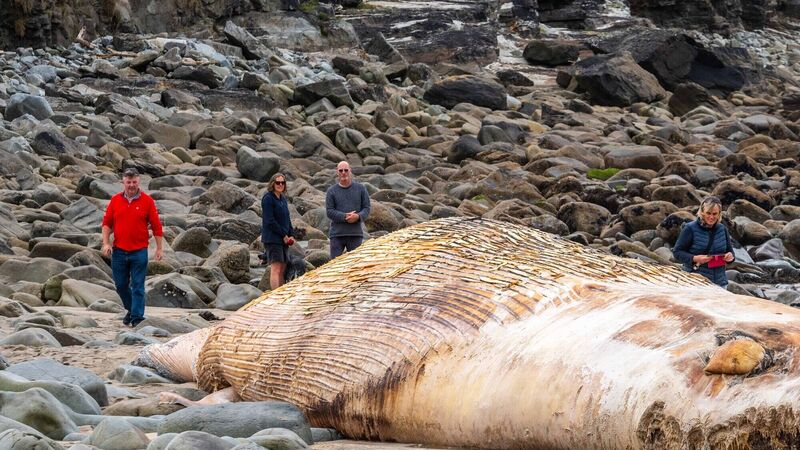'Man-made impacts' could be why fin whale beached in Cork

Pictured is the Fin Whale which washed up on Lackenakea Bay Beach near Barleycove this week. Picture: Andy Gibson.
A West Cork zoologist has said that “man-made impacts” could be why a fin whale beached near Barleycove.
Nic Slocum, the owner of Whale Watching West Cork, told The Echo that the beaching could be the product of climate change and overfishing. The fin whale was discovered earlier this week at Lackenakea Bay beach.
“It’s extremely sad to see that this huge animal has washed up,” said Mr Slocum. “Diving into the science of it, the reality is that this animal was probably sick.
“If I understand correctly, this whale was already dead when it came ashore, so it died at sea. It is in a fairly advanced state of decomposition, so it will be difficult to determine a cause of death.”
Mr Slocum said: “It’s impossible to tell if it was man-made impacts that caused it to die, but the impact that man is having on the ocean is a negative one, there’s no question about it. It could have died from a number of things, like natural causes; being attacked and mortally wounded, although I would put that fairly low on the list; or from a lack of food.
“It is generally considered that most commercial fish stocks are overfished. If you take certain species out of a food chain, it can have knock-on effects for other species, because you cause an imbalance in the ecosystem.
“It’s probably not one singular thing, but when you have overfishing, climate change, and the stresses we put on the marine environment as a whole, all of that could have an impact. It’s incredibly difficult to know, but this whale could have died of causes exacerbated by mankind. We don’t know exactly how long fin whales live for, but the current thinking is that they will live for at least as long as humans. We don’t know how old this animal is, [but] if it was an adult, it would indicate that it could have been between 50 and 70 years old.”
Regarding what is likely to come next in terms of a removal of the animal, Mr Slocum said that this is down to the local authority.
“Traditionally, the council will come along and remove it, but that is quite difficult, because it’s fairly large, so a lot of the time they will bury them in situ,” said Mr Slocum.
“This happened with a large sperm whale that washed up on Long Strand about 20 years ago. They dug a huge hole with a digger, and buried it on the beach; so I suspect that is what they will do with this one, because it is potentially a health risk to humans. People going down there should be careful not to touch it, because it will be a harbour for bacteria.”
Cork County Council has been contacted for a comment.







 App?
App?


